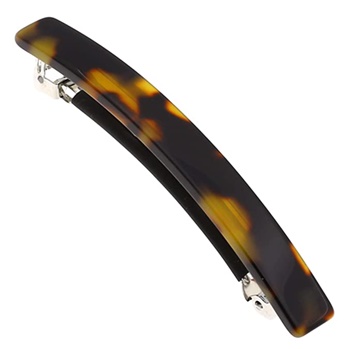Hair Glossary
Lastest Added Terms
Term: Barrette
Barrettes are a cateogry of hair accessory, jewel and/or adornment which may be utilized for functional reasons to clasp or contain hair in place, as a decorative piece, or both.

Barrettes may also be known as hairclasps, slides and/or hair clips. They are also known as elongated hair clips.
Barrettes are sometimes used purely for decorative purposes and may be encrusted with diamonds, pearls and other expensive gems or adornments.
The word barrette is borrowed from French barrette and from barre (bar) + ette which literally means small bar.
Barrettes Were Invented In The 20th Century
Many different kinds of hair clips were invented in the 20th century.
Elongated hair clips known as barrettes were invented in 1972 by Marnie Bjornson.
It involves a simple bendy base clips which works by snapping the clip from a concave to a convest positon locking the clip and any hair it is holding into a locked position.
The clip can be easily opened with a simple squeezing of the metal base.
United States Patent US3805813A
United States Patent US3805813A was award to LADY JAYNE HAIR PROD Lt. The inventor of the barrette is listed as M Laughton.
According to the Patent, a barrette is a hairclasp of the automatic kind which springs open when its catch is released.
Each Barrete Contains A Type of Catch And A Spring Of The Bow Shape
It comprises a base provided with a decorative top, a tongue hinged at one end to the base and at its other end releasably connected to the base by means of the catch and a spring of bow shape bearing at its ends on the base and at an intermediate portion on the tongue.
Catch May Contain Two Hooks Bent Up From The Base
The catch comprises at least one, but preferably two hooks, bent up from the base and urged into engagement with keepers on the tongue to hold the clasp closed, and a release
member formed by an extension of the spring beyond its bearing on the base near the hooks.
The release section co-operates with cam surfaces on the hooks so shaped that when the release member is pressed towards the base, the hooks are urged apart and out of engagement with the keepers and the tongue springs open.
In one type of barrette, a clasp is used to secure the barrette in place; the clasp opens when the two metal pieces at either side are pressed together.
The American English Versus British English Name
A barrette is the American English name while the hair clasp or hair slide is the British English name.
The actual base of the barrette clasp can be made of a variety of materials including metal, plastic or even elastic.
All barrettes are unique and may be topped by plastic, cellulose or a wide variety of materials including, but not limited to, leather, silk, satin, lace, velvet or a combination of different fabrics.
Barrettes May Be Worn In A Variety Of Styles
Barrettes are worn in several different ways partly according to their size, with small ones often used at the front and large ones in the back to hold more hair.
They are used to keep hair out of the eyes, or to secure a bun, French twist, or ponytail.
Short metal clip style barrettes are sometimes used to pull back targeted pieces of hair around the hairline.
Large Or Volume Barrettes
Larger barrettes which measure as long as 3–4 inches or even longer (8–10+ cm) are designed to pull long to very long or thick to very thick amounts of hair.
Selecting barrettes can be challenging for people with thick hair because if the barrette isn't large enough to capture all of the desired hair, the barrette may seem to pop right back open. Or they barrette may be too full of hair to close in the first place.
For people with really thick, wavy, curly, kinly or extra long hair, there are barrettes which are marketed as volume or extra large barrettes.
Large barrettes are usually worn at the back of the head, and may be used to function as ponytail clasps or for half up/half down hairstyles. Sometimes the volume barrettes are positioned at the nape of the neck in a low down ponytail clasp.
All Width Of Barrettes
If the intent is to pull hair back, the length of the barrette is not the only consideration. The width of the barrette also indicates approximately how much hair can be secured by it.
Barrettes are available in a wide range of widths.
Barrettes Never Go Out Of Hair Fashion
Although their colors and decorative toppings may change with fashion trends, barrettes never ever go out of hair fashion style.
Many of the hand made French barrettes constructed of cellulose are made by a handful of French families who have been in business for many years.



